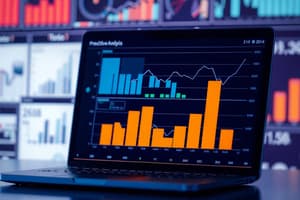Podcast
Questions and Answers
What is commonly referred to as constraints in optimization problems?
What is commonly referred to as constraints in optimization problems?
- Physical laws or company policies (correct)
- Data coefficients used in decision-making
- Various optimization algorithms
- Common guidelines for data input
Which aspect of decision-making requires more granularity with shorter planning periods?
Which aspect of decision-making requires more granularity with shorter planning periods?
- Daily operational costs
- Data to be input as coefficients (correct)
- Overall sales projections
- Long-term investment strategies
In optimization, how should an objective be stated to achieve optimal results?
In optimization, how should an objective be stated to achieve optimal results?
- To maximize or minimize a specific metric (correct)
- To increase operational costs
- To allocate maximum resources
- To minimize future sales
Which problem is NOT traditionally addressed by optimization techniques?
Which problem is NOT traditionally addressed by optimization techniques?
What influences the design of optimization algorithms regarding precision and time?
What influences the design of optimization algorithms regarding precision and time?
Which of the following is a cross-functional application of optimization?
Which of the following is a cross-functional application of optimization?
When determining the cost of raw materials in optimization, which factor is essential?
When determining the cost of raw materials in optimization, which factor is essential?
Which of the following scenarios requires the use of optimization algorithms?
Which of the following scenarios requires the use of optimization algorithms?
Under what circumstances is heuristics preferred over optimization?
Under what circumstances is heuristics preferred over optimization?
Which of the following is a characteristic of heuristics?
Which of the following is a characteristic of heuristics?
In which situation might optimization be a better choice than heuristics?
In which situation might optimization be a better choice than heuristics?
What analogy is used to describe the approach of heuristics?
What analogy is used to describe the approach of heuristics?
What kind of techniques do heuristics utilize?
What kind of techniques do heuristics utilize?
Which tool is commonly mentioned as useful for making business decisions through heuristics?
Which tool is commonly mentioned as useful for making business decisions through heuristics?
Which feature of Excel is specifically designed to help define rules for decision-making?
Which feature of Excel is specifically designed to help define rules for decision-making?
What is a limitation of using heuristics compared to optimization?
What is a limitation of using heuristics compared to optimization?
In which of the following situations is optimization unnecessary and rules of thumb would suffice?
In which of the following situations is optimization unnecessary and rules of thumb would suffice?
What is a primary disadvantage of using rules of thumb in decision-making?
What is a primary disadvantage of using rules of thumb in decision-making?
Which of the following is NOT a pro of using optimization for decision-making?
Which of the following is NOT a pro of using optimization for decision-making?
Which component is NOT part of an optimization problem?
Which component is NOT part of an optimization problem?
What is one of the main reasons why rules of thumb are often easier to implement than optimization techniques?
What is one of the main reasons why rules of thumb are often easier to implement than optimization techniques?
Which of the following describes a common limitation of rules of thumb?
Which of the following describes a common limitation of rules of thumb?
Which statement about optimization techniques is true?
Which statement about optimization techniques is true?
Which of the following is a key function of decision variables in optimization?
Which of the following is a key function of decision variables in optimization?
Flashcards
Optimization Problem Size
Optimization Problem Size
Complex problems involving hundreds of thousands to millions of individual decisions.
Input Data (Coefficients)
Input Data (Coefficients)
Data used in optimization problems, which can be costs, prices, Bill of Materials (BOMs), or yields.
Constraints/Bounds
Constraints/Bounds
Business realities or restrictions, such as physical limits or company policies.
Optimization Objective
Optimization Objective
Signup and view all the flashcards
Optimization Algorithm
Optimization Algorithm
Signup and view all the flashcards
Traditional Optimization Applications
Traditional Optimization Applications
Signup and view all the flashcards
Modern Optimization Applications
Modern Optimization Applications
Signup and view all the flashcards
Granular Data
Granular Data
Signup and view all the flashcards
Optimization vs. Rules of Thumb
Optimization vs. Rules of Thumb
Signup and view all the flashcards
Raw Material Purchases (Rule of Thumb)
Raw Material Purchases (Rule of Thumb)
Signup and view all the flashcards
Capacity Allocation (Rule of Thumb)
Capacity Allocation (Rule of Thumb)
Signup and view all the flashcards
Decision Variables
Decision Variables
Signup and view all the flashcards
Optimization Problem Parts
Optimization Problem Parts
Signup and view all the flashcards
Optimization Process
Optimization Process
Signup and view all the flashcards
Optimization Problem
Optimization Problem
Signup and view all the flashcards
Constrained Optimization
Constrained Optimization
Signup and view all the flashcards
Optimization vs. Heuristics
Optimization vs. Heuristics
Signup and view all the flashcards
Heuristics Definition
Heuristics Definition
Signup and view all the flashcards
Frequency of Decisions
Frequency of Decisions
Signup and view all the flashcards
Heuristics Application
Heuristics Application
Signup and view all the flashcards
Heuristic Process
Heuristic Process
Signup and view all the flashcards
Heuristic Analogy
Heuristic Analogy
Signup and view all the flashcards
Optimization Analogy
Optimization Analogy
Signup and view all the flashcards
Excel's Role in Decisions
Excel's Role in Decisions
Signup and view all the flashcards
Study Notes
Prescriptive Analytics
- Prescriptive analytics is the final stage of business analytics
- It finds and suggests the best decision options for a given situation
- It involves data collection, information extraction, forecasting, optimization, visualization, and what-if analysis
- It suggests the best decisions based on predictions and illustrates the implications of each decision option
Difficulty
- Prescriptive analytics determines "What do we need to do to achieve this?"
- It uses technology to analyze data and help businesses make better decisions
- It considers possible situations, scenarios, resources, past performance, and current performance, then suggests a course of action
- It can be used for immediate and long-term decisions
- It is the opposite of descriptive analytics, which examines decisions and outcomes after the fact
Key Takeaways
- Prescriptive analytics figures out what needs to be done to reach a goal
- It uses machine learning to decide the best course of action, based on computer predictions
- It uses predictive analytics to determine near-term results
- It helps organizations decide with facts and probabilities rather than instinct
- Its effectiveness depends upon the quality of its input data
How Prescriptive Analytics Works
- It tries to answer "How do we get to this point?"
- It uses artificial intelligence, such as machine learning, to understand and learn from data
- It continually adjusts to new data, and adapts during its learning process
Examples of Prescriptive Analytics
- Assessing wildfire evacuation needs
- Forecasting article popularity based on reader data
- Adjusting worker training programs based on progress
- Optimizing hospital patient outcomes through cost-effectiveness of treatments
- Adjusting airline ticket prices based on demand, weather, and fuel prices
- Better serving customers in banking, and maximizing company profits
Prescriptive Analytics in Marketing
- Critical in the marketing sector to stay ahead of consumer trends and leverage past performance
- It can develop effective marketing campaigns targeting specific customer demographics
- Helps define how to engage customers and effectively price and discount products/services
How Prescriptive Analytics Works (continued)
- Heuristic algorithms do not guarantee the best answer, but offer a quick approach for good answers
- Exact algorithms guarantee the best answer, but require more time for complex problems
Optimizations
- Optimization uses mathematical modeling & algorithms to find the best solution
- It outlines decisions as mathematical equations and models
- It utilizes algorithms to identify that best solution
- Decision variables are the questions to be answered
- Data input (coefficients) are costs, prices, bills of materials or yields
Optimization Considerations
- It's used for complex problems unsuitable for heuristics
- Examples include transportation, equipment replacement, assignment problems, blending, etc.
Studying That Suits You
Use AI to generate personalized quizzes and flashcards to suit your learning preferences.




